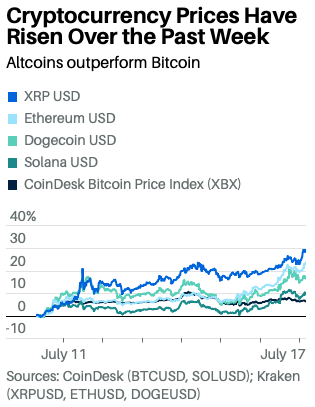The crypto industry notched a major victory on Thursday, securing legislation that could lead to digital assets becoming a significant part of Americans’ everyday lives. But delays in enacting the bill shows the industry’s power still has limits.
On Thursday afternoon, the House of Representatives in a 308-122 vote passed a bill that would set rules for so-called stablecoins, a type of cryptocurrency whose value is most often pegged to the dollar and backed by reserves. The Senate already passed the bill in June, and the White House on Thursday said President Donald Trump will sign it into law as soon as Friday.
The bill, called the Genius Act, has been a longstanding target for stablecoin company Circle Internet Group and crypto trading platform Coinbase Global. Its passage is the culmination of a multiyear effort to lobby lawmakers over to crypto’s cause—and to finance the campaigns of others who promised to support the industry.
Crypto supporters largely agree that the bills considered by Congress could transform the sector and allow for more investments, especially from institutions.
The crypto industry still has much it wants to accomplish even after Thursday’s expected victory. High on crypto boosters’ wish list is legislation to establish rulesfor crypto exchanges, brokers and tokens. But it will be more difficult for the industry to build the coalition it needs to push through that larger agenda.
On Thursday, the House also passed a bill on a 294-134 vote to establish those other rules. Seventy-eight Democrats voted in favor of the bill, more than the 71 Democrats who voted in favor of a separate bill to create crypto rules last year.
Unlike the stablecoin bill, the Senate has yet to vote on market-structure legislation.
The Senate seems a long ways away from building the bipartisan support needed to avoid a filibuster and move it into law, wrote TD Cowen analyst Jaret Seiberg in a research note this week.
“Passing this bill is symbolically important, but what will matter is the language that the Senate can pass,” Seiberg said.
Seiberg said he doesn’t expect to get full details on what the Senate plans until late this year or early next year.

Part of the hangup is that while several senators for years have pushed digital-assets tied legislation, the Senate and its committees as a whole haven’t done nearly as much work building a consensus as their counterparts in the House. Former Sen. Sherrod Brown (D., Ohio), who chaired the Senate Banking Committee, was a crypto skeptic, and he and other progressive Democrats largely froze bills moving forward even as the Republican-led House forged ahead.
The second hang-up is substantive. Some Democratic senators, including Sen. Elizabeth Warren (D., Mass.), have argued that the crypto bills would let the industry run roughshod over
investor protection laws and leave enforcement to undermanned agencies like the Commodity Futures Trading Commission not used to policing a large industry. They say that current investor laws that pertain to securities are already good enough.
Not helping matters is Trump’s own crypto ventures. The stablecoin bill itself almost faltered in the Senate after Democrats expressed concerns that it didn’t prohibit Trump or other government officials from profiting from the coins.
The Trump family owns an interest in crypto firm World Liberty Financial. Its token sales generated more than $57 million for the president, according to anethics disclosure, and the firm this year launched its own stablecoin. Some Democrats will no doubt push for restrictions on Trump profiting off crypto in a new bill.






